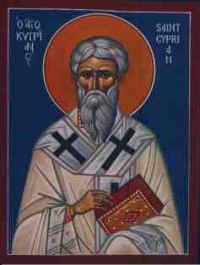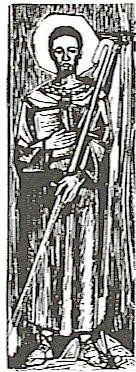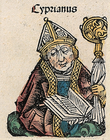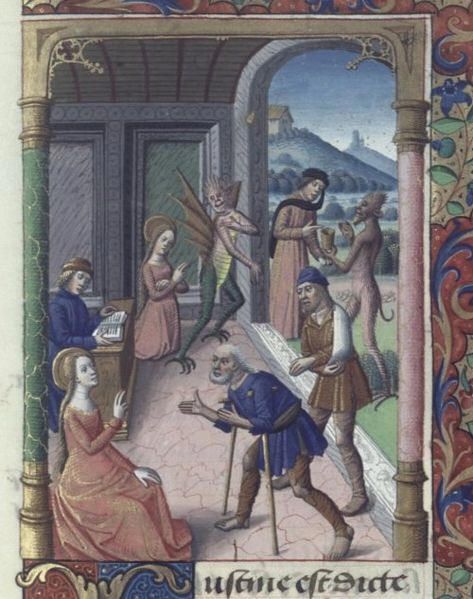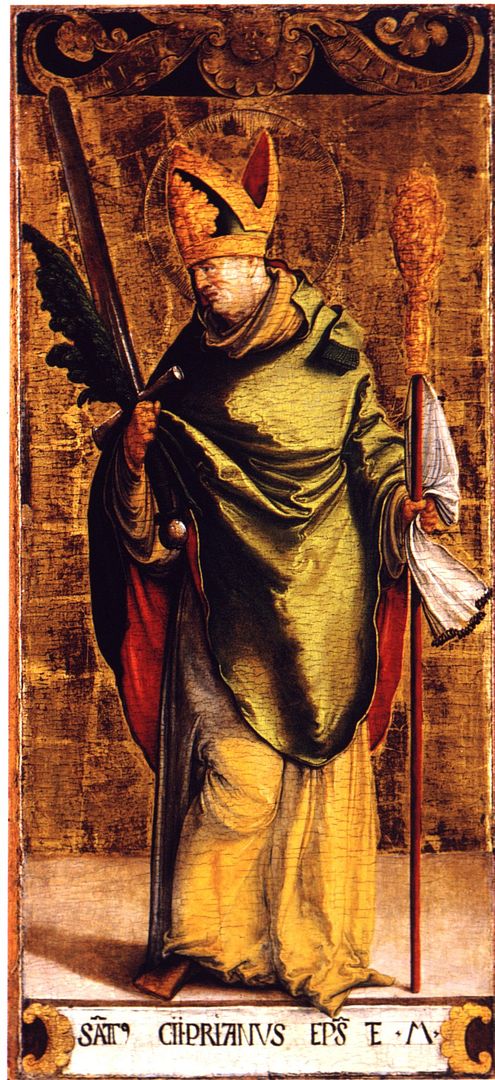“Every Christian must be a living book wherein one can read the teaching of the gospel. This is what St. Paul says to the Corinthians, ‘Clearly you are a letter of Christ which I have delivered, a letter written not with ink, but by the Spirit of the living God, not on tablets of stone but on tablets of flesh in the heart’ (2 Corinthians 3:3). Our heart is the parchment; through my ministry the Holy Spirit is the writer because ‘my tongue is like the pen of a ready scribe’ (Psalm 45:1)." (from a sermon by Saint Joseph of Leonessa)
Today, February 4, we celebrate the feast of
Saint Joseph of Leonessa (Giovanni da Leonessa, 1556-1612), missionary, friar, and confessor. Saint Joseph is known for his brave and tireless preaching throughout Europe and Muslim lands, sacrificing his own comfort and safety to bring the Word of God to those in need.
Born Eufranio Desiderio in Leonessa, Italy, a small town in Umbria, Joseph demonstrated considerable piety and devotion from infancy. As soon as he was old enough to move about, Joseph spent his days erecting alters and praying before them, encouraging his play companions to join him in his daily exhortations. The third of eight children, he and his siblings were doubly orphaned when Joseph was just 12 years old. His uncle, a teacher in nearby Viterbo, undertook the care and education of Joseph.

Joseph, while living in the care of his uncle, continued in his religious development, feeling the call of the Lord to religious life growing within him. His uncle, however, had arranged a suitable marriage for him, and upon his sixteenth birthday made arrangements for the wedding to occur. Joseph fell ill with fever, and upon recovering, petitioned the Capuchin reform of the Franciscan Order to enter. He was approved and made his novitiate in the convent near Assisi, taking the name Joseph. From his entrance into the Order, he exemplified a single-minded resolve to reach what he called
"the inexpressible joy of being a son of St. Francis."
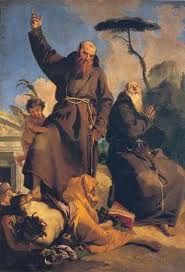 |
Saint Joseph of Leonessa
with Saint Fidelis of Sigmaringen |
Joseph became known for his abstinence and austere embrace of life. He referred to himself as “Brother Ass,” saying to his hungry body:
"there is no need to feed thee as a noble horse would be fed; thou must be content to be a poor ass." In 1599, the year before his Jubilee year, he fasted for the entire year in preparation of receiving an indulgence. Saint Joseph preached and traveled with fellow Capuchin friar,
Saint Fidelis of Sigmaringen, until the latter’s martyrdom.
At the age of 31, Saint Joseph was dispatched to Constantinople, with the intent of ministering to the Christians help captive in Muslim lands. Following a dangerous journey, Saint Joseph took residence in a run-down lodging of Benedictine monks, living in abject poverty, and ministering to those in need. The example of Saint Joseph and his companions attracted the attention of the Turks, who visited the new missionaries in great numbers. Saint Joseph, despite prohibitions, ministered to the captive Christians and preached in the town squares each day, until his arrest.
Upon release, this zealous holy man sought audience with the Sultan, to preach the Good News in his court. Joseph was captured and condemned to death for his audacity, and was hung by metal hooks through his right hand and foot on the gallows over a smoky fire. There he remained, alive, for three days until (as Holy Legend recounts) he was miraculously freed by an angel.
For reasons of safety and recovery, Joseph was recalled to Italy, and spent the remainder of his days traveling and preaching throughout the region, continuing his missionary work, and living with the same spirit of poverty. He would preach and celebrate Mass six or seven times a day, and became known by his brothers as the “Companion Killer” as the brothers assigned to accompany him generally tired and succumbed to the rigor of his zealous pace.
Saint Joseph also spent considerable time and energy in feeding, clothing, and caring for the poor, the sick, and the imprisoned. He cultivated a garden from which to harvest food for those in need, washed the clothes of the poor by hand, cut their hair, and ministered to their spiritual needs. Never tiring, Joseph established hospitals, homeless shelters, and food banks throughout Italy. With his crucifix in hand, he would wade into gang fights and brawls, praying, and preaching peace and good sense. His nephew, also a Capuchin, praised his zeal, saying,
"Wherever he found hatred and quarrels he went there in hope of restoring peace. He paid no heed to storms, snow, impossible roads. Exhorting, ’Lord make me an instrument of your peace!’ and clutching the crucifix to his heart or raising it to the heavens, no one could resist him.”
When Joseph reached the end of his days, he asked to be transported to Leonessa. There, he made his goodbyes with family and friends, and raised his crucifix to bless his home town. He was taken to Amatrice, to see his nephew, and too weak to recite the Divine Office, is said to have prayed:
"Today is a Saturday dedicated to Mary. Like Francis, I will be happy to die on this day. Holy Mary, help the suffering." Dying peacefully, his relics are enshrined in Leonessa.
Saint Joseph suffered illness, poverty, and exhaustion throughout his life, never ceasing in his efforts to bring the peace of Christ to those around him. He embraced his suffering, contemplating the wounds of Christ, and frequently exclaiming,
"When we suffer anything we give proof of our love." We look to Saint Joseph of Leonessa as a shining example of the union of joy and suffering made manifest by Our Lord on the cross, and the experience of Our Blessed Mother throughout her life. May we, like this holy saint, embrace our own personal sufferings as bringing us closer to our risen Lord, and for expiation of the sins of the world.
Almighty God,
You made Saint Joseph an illustrious preacher of the gospel.
Through his prayers inflame us with love
and with his zeal for souls that we may serve You alone.
Amen.
Year 2: Day 35 of 365
Prayer Intentions: Zeal for the Lord; Joy in our Sufferings.
Requested Intentions: Successful employment (N): Freedom from mental illness for a friend (L); For successful marriage (N); For friends having and recovering from surgery; for the reduction of a brain tumor (L); For resolution of a housing crisis (P); For a brother who is struggling financially, for a son who is struggling academically (B); For financial security for a friend (C); Success in business; familial happiness and health (J); Health and recovery of a sister (I); Development of a chaste relationship pleasing to the Lord (E); Successful surgery of mother; delivery of daughters’ babies (L); For a friend suffering with depression (M); For a friend entering religious life (R); Success of a parish men’s retreat (H); For a mother who is grieving; for the soul of a dearly departed son (M); Reconciliation of a marriage (M); End to grief after death of son (B&C); End to grief (S); Successful marriage (N); For an RCIA candidate struggling with financial and family stressors (O); Freedom from anxiety regarding medical procedure (J); Return home of an ill mother, peace and financial security (J); Healing of a father following stroke (S).













